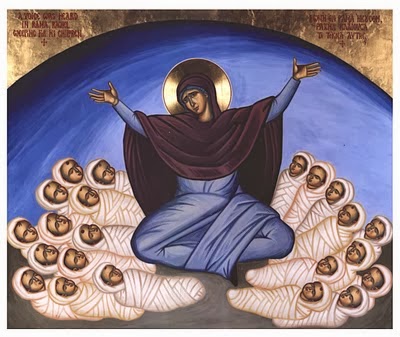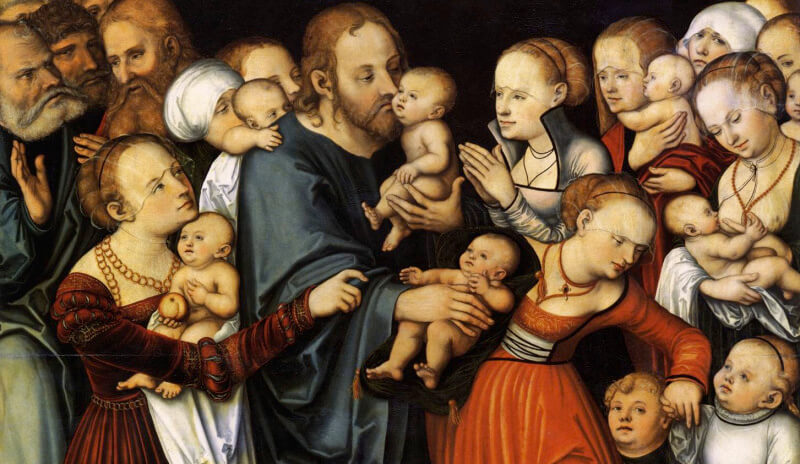Sermon at the prayer of the Sant’Egidio community in Budapest, 22 November 2015
In the past 20 years, tens of thousands have drowned in the Mediterranean, people who were fleeing from war, famine, tyranny in the hope of a better life, a more humane life or even in the hope of life at all.
The flood of refugees in these past months, in particular, has resulted in many victims.
Crowds of vulnerable people have been tricked by smugglers, other people are driven by ill will or prejudice have taken the dignity of the refugees and many of them died because of accidents and sickness on the way.
We remember all the victims in this hour with prayer, understanding their fates especially through the vulnerability and tragedies of the children.
People were bringing little children to Jesus for him to place his hands on them, but the disciples rebuked them. When Jesus saw this, he was indignant.
He said to them, “Let the little children come to me, and do not hinder them, for the kingdom of God belongs to such as these. Truly I tell you, anyone who will not receive the kingdom of God like a little child will never enter it.” And he took the children in his arms, placed his hands on them and blessed them. (Mk 10:13–16)
Departing from these words of Jesus, we primarily remember the children.
Those children who started their way from the Middle East, Africa or any region of the world, fleeing from war and terror or poverty and unbearable circumstances. They were driven by the hope that somewhere far away they will find a new home.
One of them was carried by the mother in a sling. The other travelled on the father’s back. A sibling pushed the hundredth one in an old baby carriage and the thousandth one began the journey alone.
We saw them all in Budapest, at the Keleti railway station or stumbling along the rails at Röszke. They looked at us with huge eyes from the windows of buses and trains. They looked for safety and protection in their parents’ embrace. Occasionally, they smiled and waved.
Their hopes did come true. As perhaps also that Syrian boy survived too who suffered grave burns during the bombing of Aleppo and eventually, crossing several borders, received care at the Bethesda hospital in Budapest.
And perhaps those little ones also reached their goal whose parents smuggled them under barbed wires and fences into a world they looked unto as the Promised Land.
And we also saw the pictures of those who didn’t reach their goal, who died for hope. We will never be able to erase the picture of the 3-year-old Aylan Kurdi’s little body lying on the Turkish seaside. His brother and mother also perished when the boat filled with refugees sank into the Aegean Sea.
The smugglers were evil, the officials indifferent and perhaps the father irresponsible. At his age, the little Aylan should be playing in a safe place or running happily around on the seaside.
Instead, he is lying with his little face downwards. He is now quiet, only the waves rumble ominously. Aylan, in a red shirt, blue pants and brown shoes. As if he were asleep.
And we know, that there were at least 4 children in that truck as well, into which scoundrels, smugglers, crammed 71 Syrian and Afghan refugees who had no chance of survival. No matter the scream of the mothers, cries of the children, banging of the fathers.

We know such fates well. We have read of these fates in the book of Jeremiah:
“A voice is heard in Ramah, mourning and great weeping,Rachel weeping for her children and refusing to be comforted, because they are no more.”
Rachel cries for her children ever since…
And we too, can hear the sad voice of the widow of Sarepta, as she says: I don’t have any bread—only a handful of flour in a jar and a little olive oil in a jug. I am gathering a few sticks to take home and make a meal for myself and my son, that we may eat it—and die” (1 Kings 17:12).
And we hear the scream of the Canaanite woman: “Lord, Son of David, have mercy on me! My daughter is demon-possessed and suffering terribly” (Mt 15:22) or the words of the despairing man: “Lord, have mercy on my son,” he said. “He has seizures and is suffering greatly. He often falls into the fire or into the water.” (Mt 17:15), or the request of the synagogue leader: “My daughter has just died. But come and put your hand on her, and she will live” (Mt 9:18).
The Canaanite woman, the scared father and Jairus, the leader of the synagogue all turned to Jesus. Perhaps they had heard of his miracles. They had hope only in Him.

They knew his words: “Let the little children come to me, and do not hinder them, for the kingdom of God belongs to such as these”.
But Jesus says other things too.
One of his sentences sounds gentle: And whoever welcomes one such child in my name welcomes me” (Mt 18:5) – however, his next sentence is a firmer warning: “If anyone causes one of these little ones—those who believe in me—to stumble, it would be better for them to have a large millstone hung around their neck and to be drowned in the depths of the sea” (Mt 18:6). Lord, there are not enough millstones in the world, as we would need!
Jesus talks out of his own experience. He was only a little boy, when Herod and his henchmen caused him to stumble.
The Holy Family, too, had to flee from weapons and danger. They were migrants. Providence’s plan for them was that they should stay alive. But from then on, Jesus knew, what exile meant. That foxes have caves, birds of the sky nests but the Son of God has nowhere to lay his head.
It is the fate of this Jesus that was repeated in the sufferings of those who live during the persecution of Christians in ancient times or in the Middle Ages.
When families fled in 1944 from the concentration camps or in 1956 from the Soviet tanks. There were those who reached their goal, but then, too, there were those who died on the journey towards hope. And we don’t know whether the woman, hanging from a windowsill during the Paris terrorist attacks, crying, “I’m with child!” stayed alive? Did she and her child survive?
Rachel cries for her children, the widow of Sarepta painstakingly gathers firewood and Aylan lies, face down on the seaside.
We would like to believe that he didn’t die, that he only sleeps. Before he lay down like that, he may have prayed with simple words: “O dear God, my holy father, close my eyes, I go to slumber / but you don’t stop keeping vigil, shield all of us from the evil” (Hungarian bedtime prayer).
Lord, take little Aylan to yourself.
And look out for him, take care of his little siblings! So that they won’t have to lie like that on the sea shore, the parched ground, under barbed wire, among ruins; so that they don’t fall down from the windowsill, that their mother’s body becomes their grave.
Give us, that through the endless night we can trustingly pray: “and when the sun brakes the heaven, we may kiss each other again” (ending with the same prayer).
Bishop Dr. Tamás Fabiny
English translation: Tünde Welker

